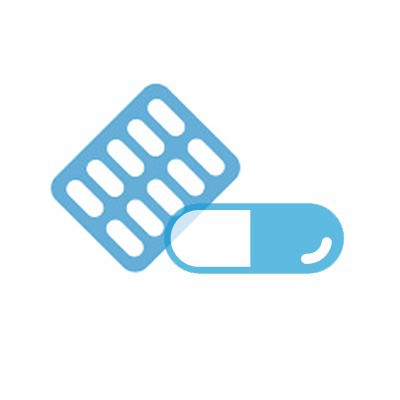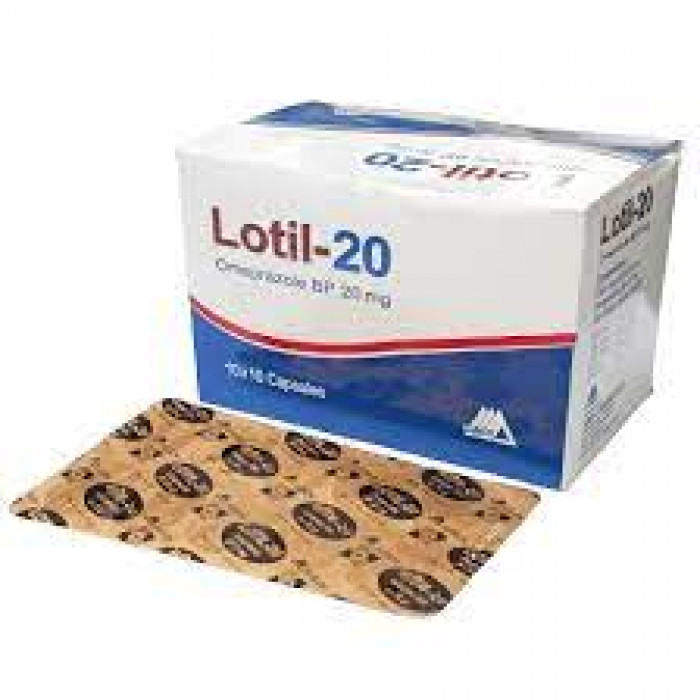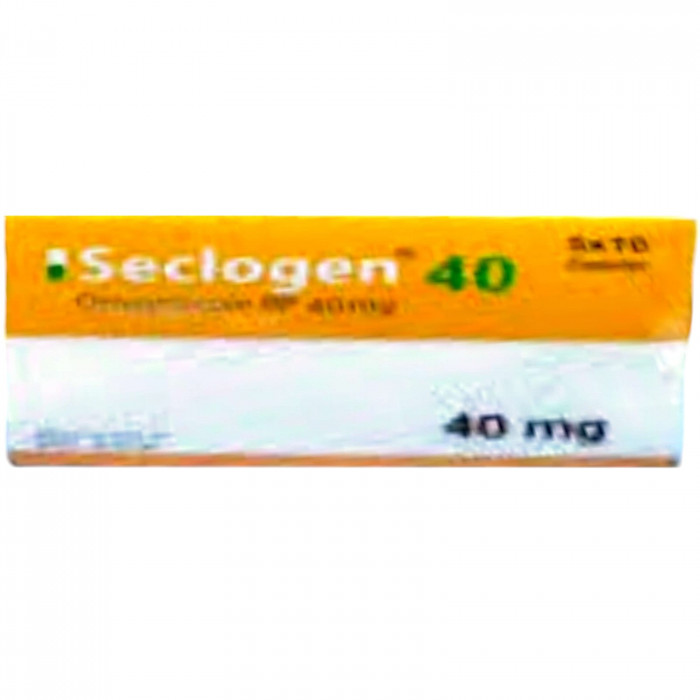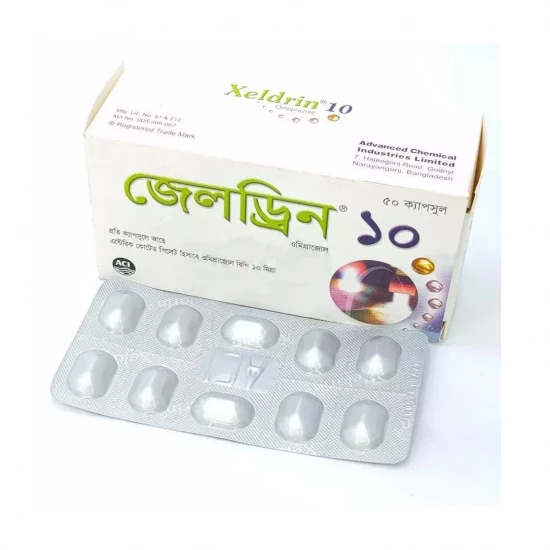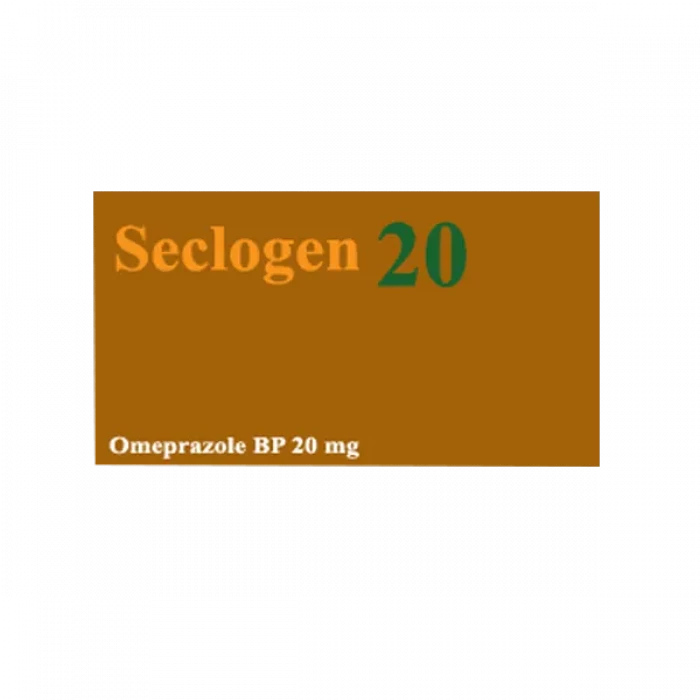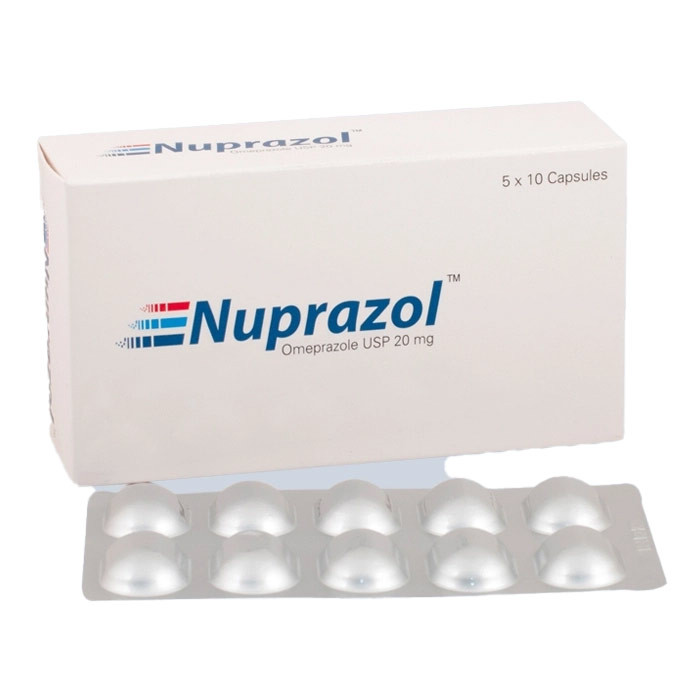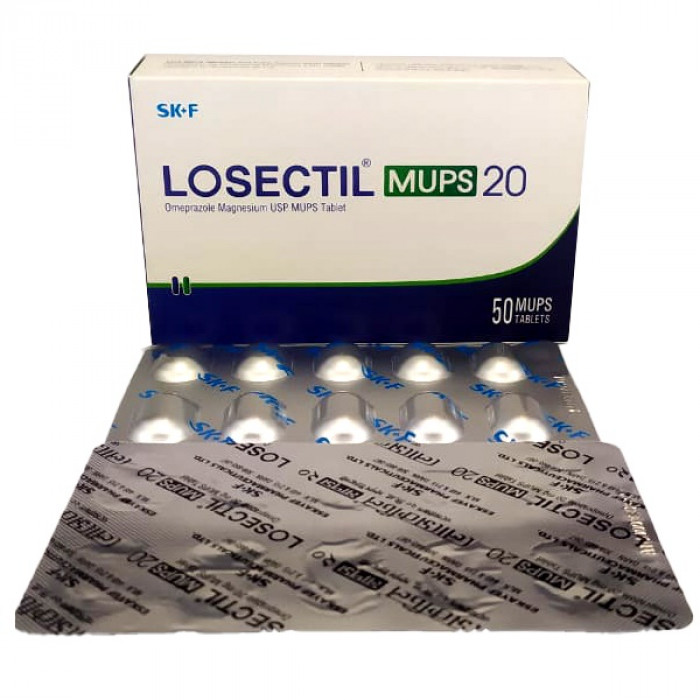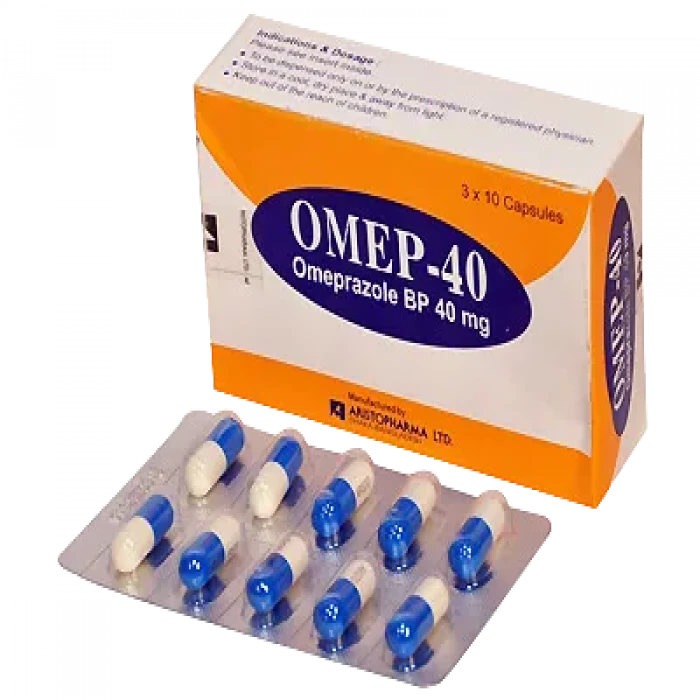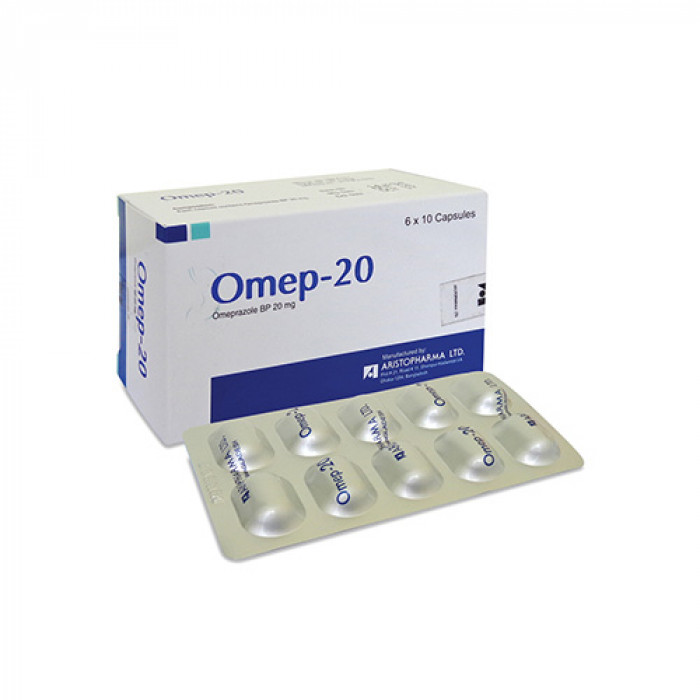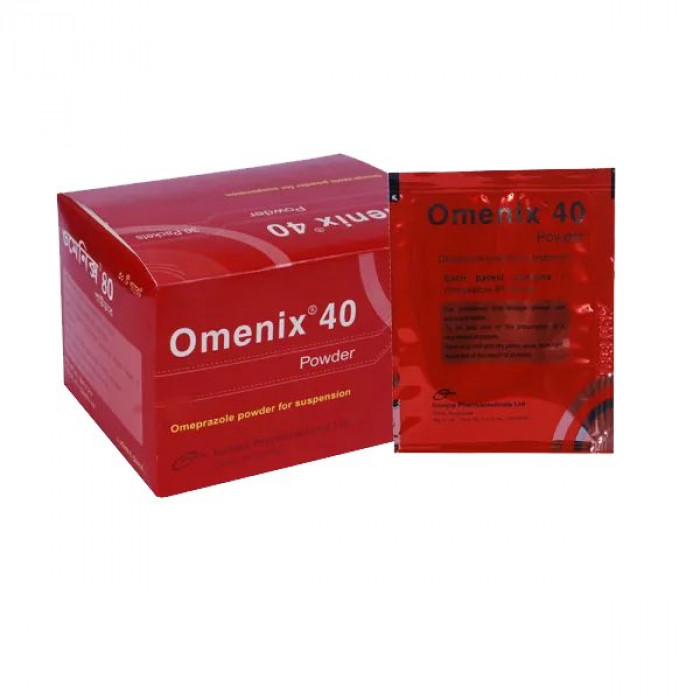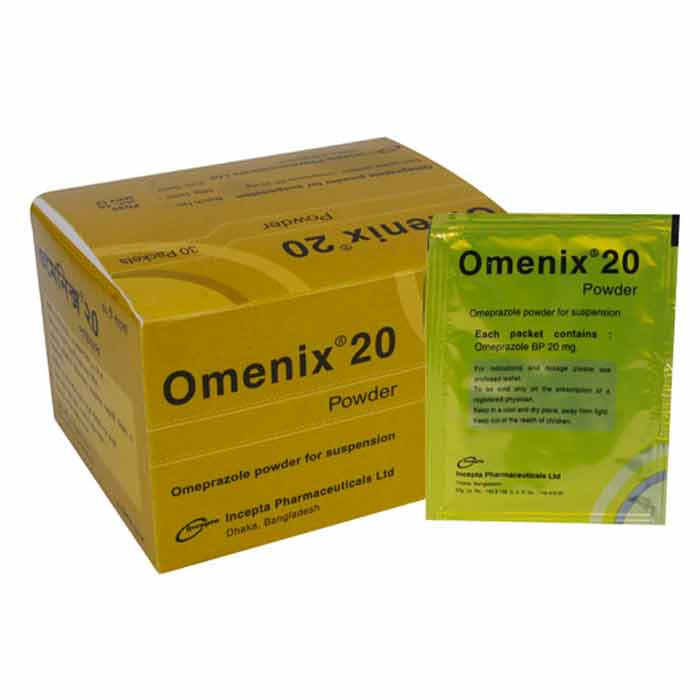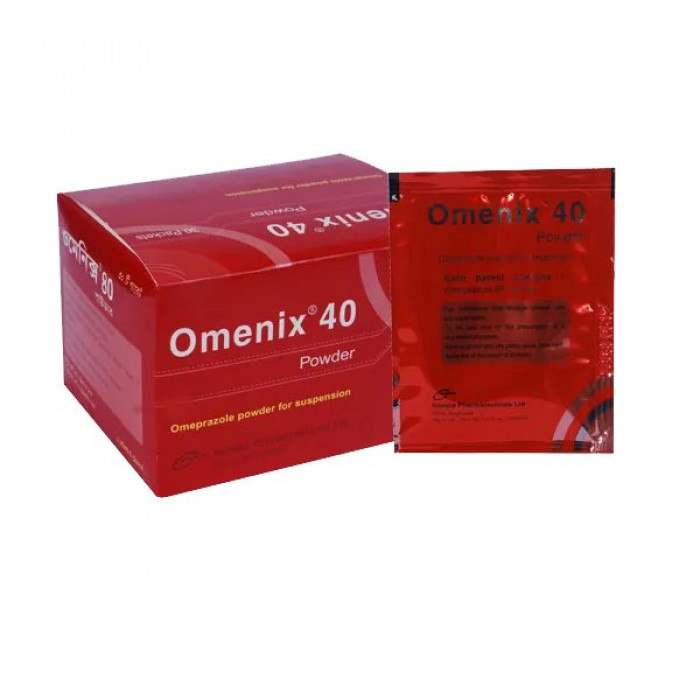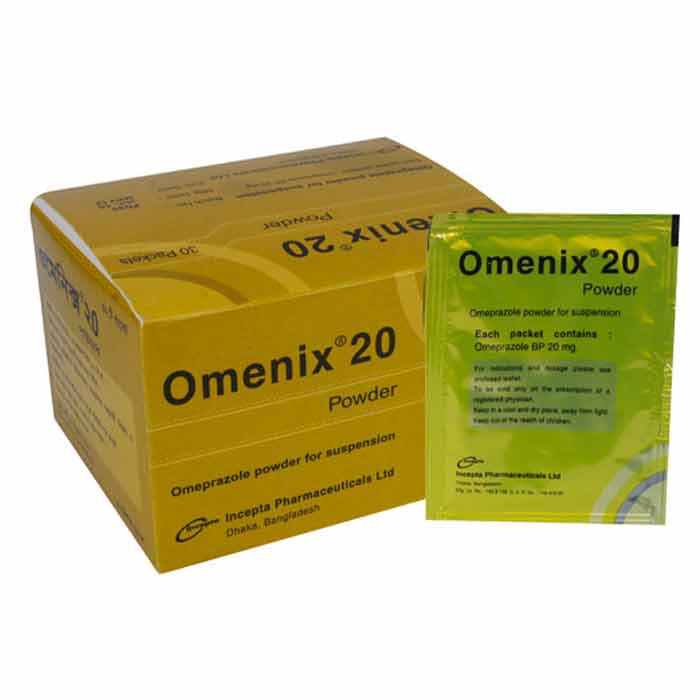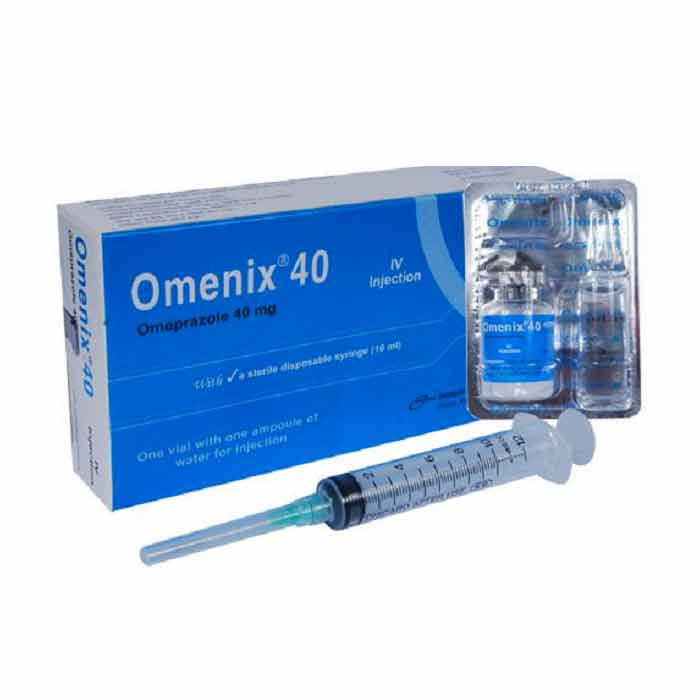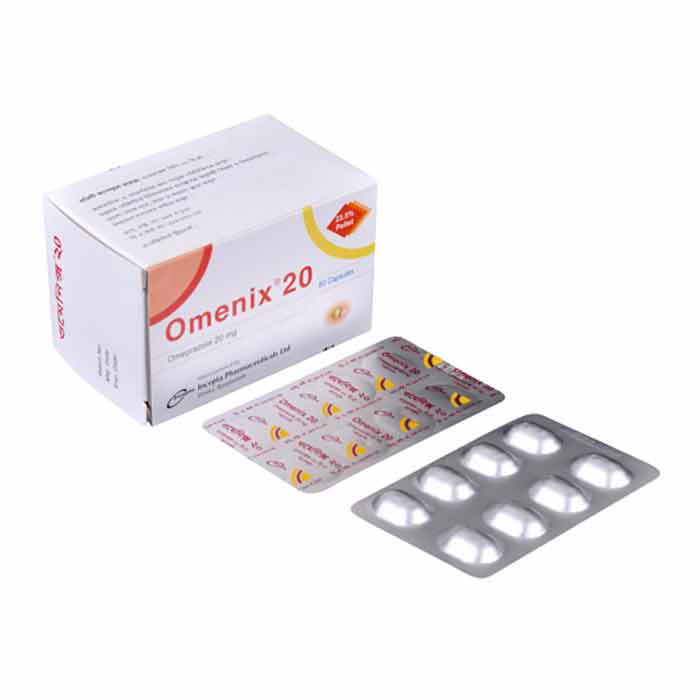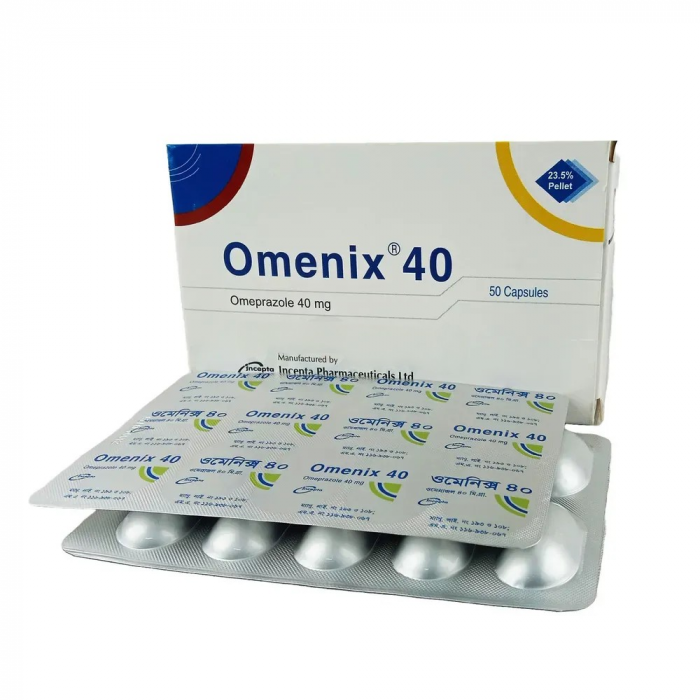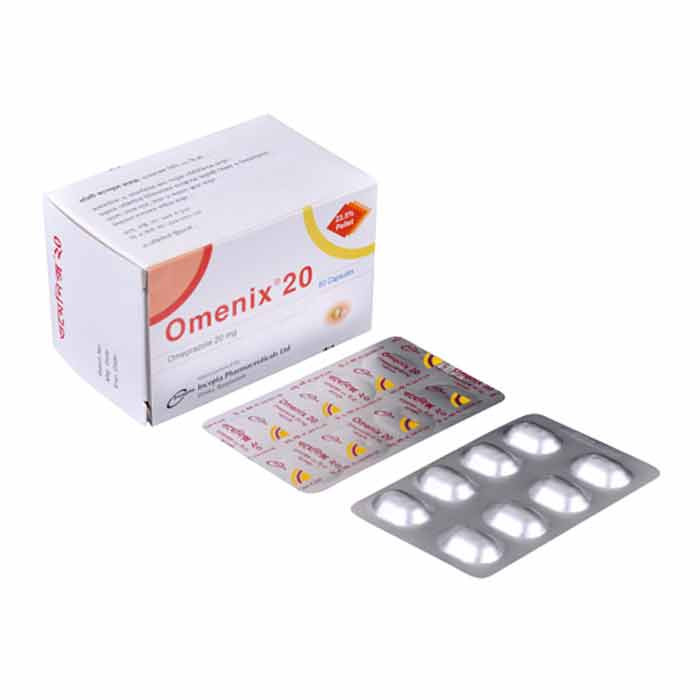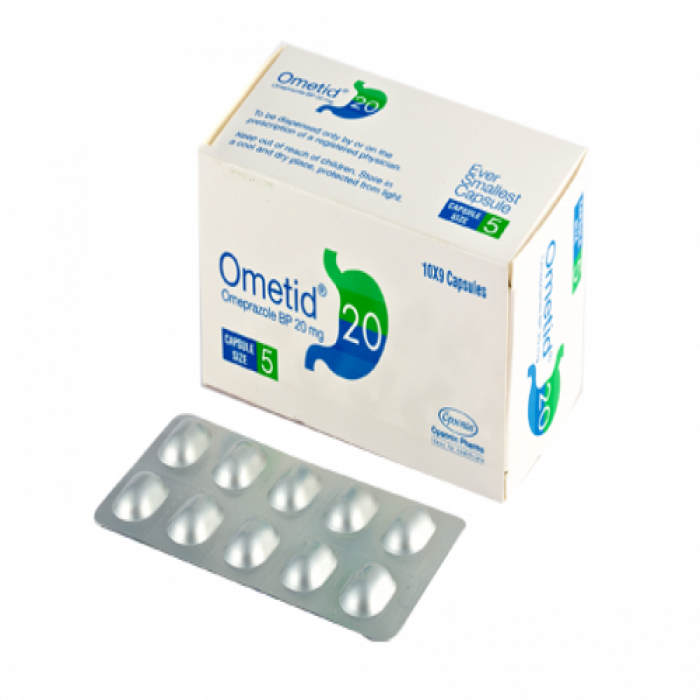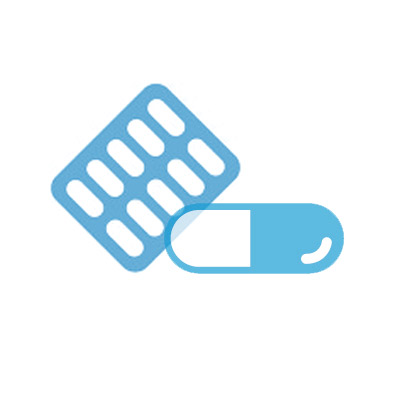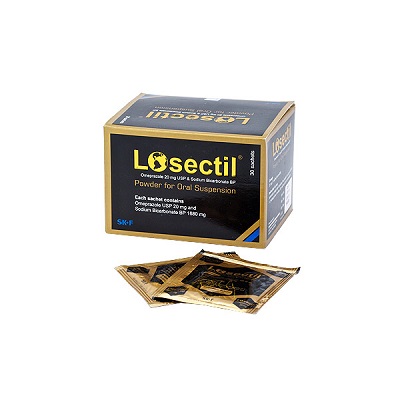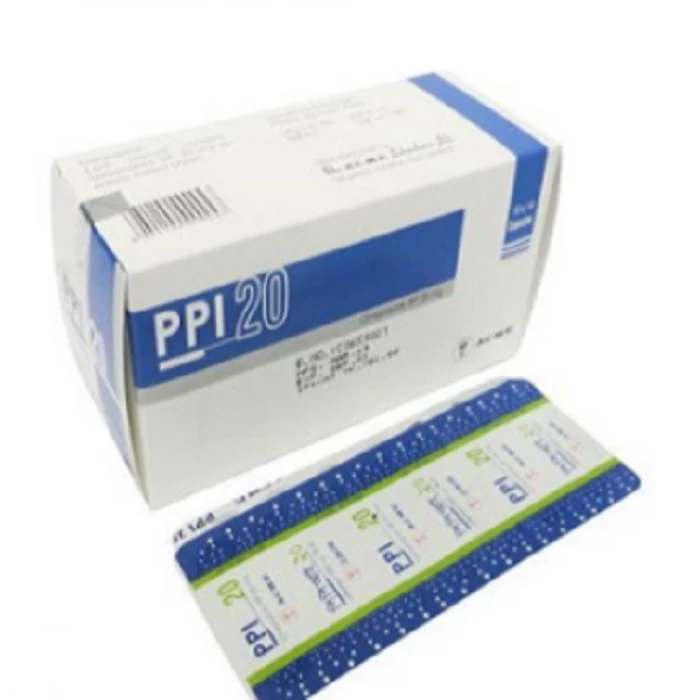
✔ 100% Authentic Product
👁️ Currently Viewing 3694
Omeprazole offers significant therapeutic gains in the treatment of acid-related diseases. Healing rates are high in duodenal ulcer, gastric ulcer, and erosive reflux oesophagitis; acid production is controlled effectively in Zollinger-Ellison Syndrome and symptom relief is prompt and sustained in all indications. Less clear-cut indications where benefit might be expected but where data are limited include:
- Prevention of stress ulceration
- Prevention of the acid aspiration syndrome
- Treatment of upper gastrointestinal bleeding
Discount
Price: ৳ 67
MRP:
৳
70.14
5%
Off

100% Genuine Products, Guaranteed

Safe & Secure Payments, Always

Fast, Secure & Efficient Delivery

Proper Packaging
 Cash on Delivery - All over Bangladesh
Cash on Delivery - All over Bangladesh Regular Delivery - 12-24 Hours, Dhaka City* Charge Tk.39-59
Regular Delivery - 12-24 Hours, Dhaka City* Charge Tk.39-59 Regular Delivery - 24-48 Hours, Other Cities* Charge Tk.99-110
Regular Delivery - 24-48 Hours, Other Cities* Charge Tk.99-110
 ফ্রি ডেলিভারিঃ - ৯৯৯ টাকা+ অর্ডারে, ঢাকা
শহরে
ফ্রি ডেলিভারিঃ - ৯৯৯ টাকা+ অর্ডারে, ঢাকা
শহরে ফ্রি ডেলিভারিঃ - ২৯৯৯ টাকা+ অর্ডারে, ঢাকার
বাহিরে
ফ্রি ডেলিভারিঃ - ২৯৯৯ টাকা+ অর্ডারে, ঢাকার
বাহিরে
100% Genuine Products, Guaranteed
Safe & Secure Payments, Always
Fast, Secure & Efficient Delivery
Proper Packaging
 Cash on Delivery - All over Bangladesh
Cash on Delivery - All over Bangladesh Regular Delivery - 12-24 Hours, Dhaka City* Charge Tk.39-59
Regular Delivery - 12-24 Hours, Dhaka City* Charge Tk.39-59 Regular Delivery - 24-48 Hours, Other Cities* Charge Tk.99-110
Regular Delivery - 24-48 Hours, Other Cities* Charge Tk.99-110 ফ্রি ডেলিভারিঃ - ৯৯৯ টাকা+ অর্ডারে, ঢাকা
শহরে
ফ্রি ডেলিভারিঃ - ৯৯৯ টাকা+ অর্ডারে, ঢাকা
শহরে ফ্রি ডেলিভারিঃ - ২৯৯৯ টাকা+ অর্ডারে, ঢাকার
বাহিরে
ফ্রি ডেলিভারিঃ - ২৯৯৯ টাকা+ অর্ডারে, ঢাকার
বাহিরে
✅ Description:
- PPI 20mg Capsule contains Omeprazole which belongs to the group of medicines called Proton pump inhibitors.
- PPI 20mg Capsule is used in the treatment of gastro-oesophageal reflux disease (acid contents in the stomach flow back into the tube connecting your mouth and stomach causing heartburn, nausea, vomiting, bitter taste, and discomfort in the upper abdomen) in children (above 1 year of age) and adults.
- PPI 20mg Capsule is used in adults to treat gastric (stomach), duodenal ulcers (upper part of the intestine), ulcers infected with Helicobacter pylori bacteria in addition to antibiotics (including children), and ulcers due to the use of non-steroidal anti-inflammatory drugs (NSAIDs).
- Also, PPI 20mg Capsule is used in adults to treat Zollinger-Ellison syndrome (increased acid secretion in the stomach due to growth in the pancreas resulting in abdominal pain, diarrhea, gnawing or discomfort in the upper abdomen, heartburn, nausea, and vomiting).
Safety Advices

Alcohol
CAUTION
Caution is advised when consuming alcohol with PPI 20. Please consult your doctor.

Pregnancy
CONSULT YOUR DOCTOR
PPI 20 may be unsafe to use during pregnancy. Although there are limited studies in humans, animal studies have shown harmful effects on the developing baby. Your doctor will weigh the benefits and any potential risks before prescribing it to you. Please consult your doctor.

Breastfeeding
CONSULT YOUR DOCTOR
SPPI 20mg Capsule is probably unsafe to use during breastfeeding. Limited human data suggests that the drug may pass into the breastmilk and harm the baby.

Driving
CAUTION
It is not known whether PPI 20mg Capsule alters the ability to drive. Do not drive if you experience any symptoms that affect your ability to concentrate and react.

Kidney
SAFE IF PRESCRIBED
PPI 20mg Capsule is safe to use in patients with kidney disease. No dose adjustment of the PPI 20mg Capsule is recommended.

Liver
CAUTION
PPI 20mg Capsule should be used with caution in patients with severe liver disease. A dose adjustment of PPI 20mg Capsule may be needed. Please consult your doctor. A lower dose may be advised in patients with liver disease and who have to take this medicine for a long time.
✔️ Uses of PPI 20mg Capsule
- Gastroesophageal reflux disease (Acid reflux)
- Treatment of Peptic ulcer disease
- Treatment of Stomach Ulcer
- Hyperacidity
✔️ How does PPI 20mg Capsule work?
PPI 20mg Capsule is a proton pump inhibitor (PPI). It works by reducing the amount of acid in the stomach which helps in the relief of acid-related indigestion and heartburn.
✔️ Side Effects of PPI 20mg Capsule
- Diarrhea
- Flatulence
- Headache
- Nausea
- Stomach pain
- Vomiting
✔️ Quick Suggestions:
- PPI 20mg Capsule is a well-tolerated medicine and provides relief for a long time.
- Inform your doctor if you get watery diarrhea, fever, or stomach pain that does not go away.
- Inform your doctor if you do not feel better after taking it for 14 days as you may be suffering from some other problem that needs attention.
- Long-term use of PPI 20mg Capsule can cause weak bones and a deficiency of minerals such as magnesium. Take adequate dietary intake of calcium and magnesium or supplements as prescribed by your doctor.
- Consult your doctor right away if you develop decreased urination, edema (swelling due to fluid retention), lower back pain, nausea, fatigue, and rash or fever. These could be signs of a kidney problem.
- Avoid excessive intake of carbonated beverages/soft drinks, citrus juices, fried food, and caffeinated beverages like tea and coffee.
- Avoid alcohol and smoking.
- Avoid eating late at night or before bedtime
✔️ Indication of PPI 20mg Capsule
Omeprazole is used to treat the following conditions:
- Duodenal and gastric ulcers
- Long-term acid reflux disease management
- Dyspepsia caused by acid
- Esophagitis with severe ulcerating reflux
- Acid aspiration prevention during general anesthesiaDuodenal and stomach ulcers caused by NSAIDs
- As a preventative measure in individuals with a history of NSAID-related duodenal and stomach ulcers.
- GERD is an abbreviation for gastroesophageal reflux disease.
- Zollinger-Ellison syndrome is a condition in which there is a buildup of toxins in
- A peptic ulcer caused by Helicobacter pylori.
✔️ Pharmacology
Omeprazole, a substituted benzimidazole, is a stomach acid secretion inhibitor. It reduces stomach acid secretion by inhibiting the enzyme system of hydrogen-potassium-adenosine triphosphatase (H+/K+ ATPase) in the gastric parietal cell. The antisecretory action begins within one hour of oral administration, with the greatest impact happening within two hours and secretion suppression lasting up to 72 hours. When the medication is stopped, secretory activity gradually recovers over 3 to 5 days.
✔️ Dosage & Administration of PPI 20mg Capsule
Oral-
Gastro-Esophageal Reflux Disease:
- 20 mg once daily for 4 weeks, continued for further 4-8 weeks if not fully healed; 40 mg once daily has been given for 8 weeks in gastro-esophageal reflux disease, refractory to other treatment; maintenance dose is 20 mg once daily.
Benign Gastric and Duodenal Ulcer:
- 20 mg once daily for 4 weeks in Duodenal Ulceration, 8 weeks in gastric ulceration; in severe or recurrent cases, the dose is to be increased to 40 mg daily; maintenance dose for recurrent duodenal ulcer, 20 mg once daily; in the prevention of relapse in duodenal ulcer, 10-20 mg daily.
NSAID-associated Duodenal or Gastric Ulcer:
- 20 mg once daily for 4 weeks, continued for further 4 weeks if not fully healed. 20 mg once daily is used as prophylaxis in patients with a history of NSAID-associated duodenal or gastric ulcers.
Long-term management of Acid Reflux Disease:
- 10-20 mg daily.
Acid-related Dyspepsia:
- 10-20 mg once daily for 2-4 weeks.
Prophylaxis of Acid Aspiration:
- 40 mg on the preceding evening, then 40 mg 2-6 hours before surgery.
Zollinger-Ellison Syndrome:
- Initially 60 mg once daily; the usual range is 20-120 mg daily (If the daily dose is more than 80 mg, 2 divided doses should be used).
Helicobacter Pylori Eradication Regimen in Peptic Ulcer Disease:
- Omeprazole is recommended at a dose of 20 mg twice daily in association with antimicrobial agents as detailed below: Amoxicillin 500 mg and Metronidazole 400 mg both three times a day for one week, or Clarithromycin 250 mg and Metronidazole 400 mg both twice a day for one week, or Amoxicillin 1 g and Clarithromycin 500 mg both twice a day for one week.
Pediatric use in severe ulcerating reflux esophagitis (Child>1 year):
- If body-weight 10-20 kg, 10-20 -mg once daily for 4-12 weeks;
- if body weight is over 20 kg, 20-40 mg once daily for 4-12 weeks.
✔️ Interaction
Omeprazole can cause diazepam, warfarin, and phenytoin to be eliminated more slowly. When Omeprazole is added to the therapy, the amount of warfarin or phenytoin may need to be reduced. Omeprazole does not appear to interact with theophylline, propranolol, or antacids.
✔️ Contraindications
Omeprazole is not recommended for people who have a history of hypersensitivity to any of the formulation's components.
✔️ Pregnancy & Lactation
- Omeprazole is classified as pregnancy category C by the US Food and Drug Administration. However, the findings of three prospective epidemiological studies show that Omeprazole has no negative effects on pregnancy or the health of the fetus/newborn child.
- There is no information on Omeprazole's entry into breast milk or its effects on the newborn. If the usage of Omeprazole is deemed necessary, breastfeeding should be terminated.
✔️ Precautions & Warnings
- When a stomach ulcer is suspected, the potential of gastric cancer should be ruled out before starting Omeprazole treatment, as the medication may relieve symptoms while delaying detection
- The risk of adverse effects may rise with continued use of this medication. For instance, using this medication for a longer period of time, especially at larger doses, may raise your risk for bone fractures. Consult your physician about measures to stop bone loss.
- Inform your physician before using PPI 20mg Capsule if you have or have previously had serious liver issues, an allergy to comparable medications, or bone loss.
- PPI 20mg Capsule may have an impact on or interact with several other medications. To ensure it is safe, let your doctor know about all other medications you are taking. If you take medications for HIV, fungus infections, TB, epilepsy (fits), or certain blood thinners, this is very crucial.
✔️ Storage Conditions
Keep away from light and heat in a dry area. Keep out of children's reach.
⚠️Disclaimer:
At ePharma, we’re committed to providing accurate and accessible health information. However, all content is intended for informational purposes only and should not replace medical advice from a qualified physician. Please consult your healthcare provider for personalized guidance. We aim to support, not substitute, the doctor-patient relationship.




